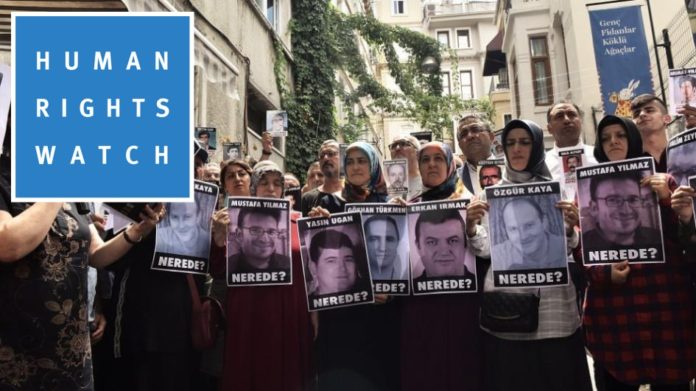(London) – The Turkish authorities’ decision to deny lawyers access to four men, who were forcibly disappeared in February 2019, but are now confirmed to be in police custody in Ankara raises concerns that the men may be being put under pressure to conceal information about their disappearance, Human Rights Watch said today.
The authorities acknowledged on July 28 that they are holding four men, Salim Zeybek, Yasin Ugan, Özgür Kaya, and Erkan Irmak, but have not revealed where they have been since February, and are implying that the men were not in the custody of the state nor their proxies before July 28. The men were detained on various dates in February and are presumed to have been held in unacknowledged detention ever since. The whereabouts of two other men, Mustafa Yılmaz and Gökhan Türkmen, who were also reported missing in February, remains unknown.
“Lawyers have been prevented from meeting the men, in violation of Turkey’s laws, which fuels our suspicion that the authorities want to hide the truth about what these four have lived through for the past five-and-a-half months,” said Tom Porteous, deputy program director at Human Rights Watch. “There needs to be a full account of what has happened to these men since February, and everyone implicated in their presumed enforced disappearances should be held to account.”
The families of the four men have been permitted to see them briefly twice in the presence of police officers, but the families’ lawyers have been completely barred from visiting them. When the families tried to ask the men where they had been since February, the men were reluctant to provide answers and the police intervened to stop further questions.
The Turkish authorities are legally obliged to grant the families’ chosen lawyers access to the men and to enable confidential meetings. They should also permit independent medical professionals to conduct full medical examinations of the four men, Human Rights Watch said.
Human Rights Watch spoke to the men’s wives about their brief meetings with their husbands.
The families had spent months publicly campaigning and lodging complaints with the authorities seeking information on their husbands’ whereabouts. The families said the men were very pale, had lost a lot of weight, and were unwilling to answer any questions about what had happened to them over the months they were missing.
The wives said the police prevented them from asking questions of the men or learning anything about their situation. The wives also reported that each of the men said, with police officers standing by, that they did not want to see a lawyer and that the wives should stop campaigning or lodging complaints about their cases and even withdraw existing complaints to international bodies and organizations.
The presence of police officers during these meetings, the men’s reported introverted manner of speaking, and apparent inability or fear to provide any information about the past five months fuels Human Rights Watch’s concern that they are being pressured to withhold information about their treatment and to collude in providing a fabricated version of their detention.
The authorities suspect the men of having links with the Fethullah Gülen religious movement, which the Turkish government has labeled a terrorist organization responsible for the July 15, 2016 coup attempt. The government has carried out an unprecedented crackdown on the movement and its followers in Turkey since that period.
Zeybek, who formerly worked for an official body, the Information Technology and Communications Board, was last seen by his wife in the custody of security forces on February 21. Officers detained him after following a car in which the couple was traveling, as they headed toward Edirne in western Turkey.
On February 13, numerous witnesses saw a large number of plain-clothed and uniformed police detain Kaya, a former teacher, and Ugan, a certified accountant, at an apartment building in an Ankara neighborhood where they were staying. The wife of Irmak, also a former teacher, saw her husband led away by two people after he had left their home in Istanbul late on the evening of February 16.
In each case, the families made great efforts to secure a full investigation into their husbands’ whereabouts, contacting multiple authorities in Turkey, including the prosecutor’s office, collecting evidence of what had happened, and running social media campaigns asking the Turkish authorities for information. But prosecutors have failed to carry out an effective investigation, complaints have been dismissed, and the families have applied to the constitutional court, where their cases are still pending.
Several parliamentarians repeatedly raised the cases in parliament and made public statements seeking investigations of the disappearances. The Ankara Bar Association and nongovernmental organizations (NGOs) the Human Rights Association and the Rights Initiative Association have all publicly reported on the cases. The authorities have made no official statement about the presumed enforced disappearance of the men or their whereabouts since February. The families have also applied to the United Nations (UN) Working Group on Enforced or Involuntary Disappearances and to the European Court of Human Rights (ECtHR).
Yılmaz and Türkmen remain unaccounted for and the Turkish authorities should immediately investigate whether they too are being held in undisclosed detention sites. Security camera footage shows Yılmaz, a physiotherapist, being abducted by two men and taken away in a black VW Transporter van after he left his home in Ankara the morning of February 19. Türkmen, who worked at the Farming and Rural Development Support Board, disappeared in the southern city of Antalya on February 7.
Human Rights Watch most recently documented abductions and enforced disappearances in Turkey in the 2017 report “In Custody: Police Torture and Abductions in Turkey.”
“After four men turned up in police custody, the Turkish authorities should urgently take steps to determine the whereabouts of Mustafa Yılmaz and Gökhan Türkmen,” Porteous said. “Forcibly disappearing people is an egregious crime and Turkey has a heinous history of forcibly disappearing people in the 1990s, as attested in multiple ECtHR judgments.”

